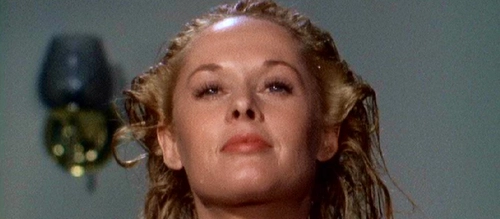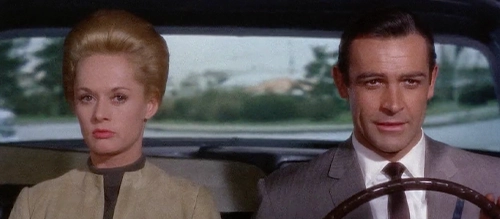
Marnie (1964)
Director: Alfred Hitchcock
Screenwriter: Jay Presson Allen
Starring: Tippi Hedren, Sean Connery, Diane Baker, Mertin Gabel, Louise Latham, Bob Sweeney
It could be suggested that iconic filmmaker Alfred Hitchcock released his last great film in 1963 with The Birds. It’s certainly one of the films people know him for the most, even those who are not massive film afficionados. Everything after that, regardless of cinematic merit, has a tendency to be very much forgotten about, for better or for worse. Marnie, coming the year after The Birds, and also starring Tippie Hedren as a last gasp for the Hitchcock Blonde, is one of those films.
There are several reasons that Marnie often gets forgotten in the Hitchcock canon, but also several fairly strong points as to why people have been sleeping on it. Hedren is Marnie, a crook who works her way into businesses (usually as a secretary or typist), robs them, then makes a getaway and changes identities, safe with several thousands of dollars. She has a love of horses and giving things to her mother in an effort to win her affections; a mother who doesn’t reciprocate her love. It’s all going well until she catches the eye of Sean Connery’s handsome Mark Rutland, who happens to recognise her from a previous company, and it’s a devilish dance between the two of them from thereon in.
Director Alfred Hitchcock, tucking into nearly forty years of directorial experience, tries to get everything he can out of the film, and on many occasions succeeds in crafting incredible cinema. The near-silent safe-stealing sequence a third of the way through the film is a stellar piece of suspenseful filmmaking, and surely the standout moment of its 130 minute runtime. The interplay between Hedren and Connery is also great to watch, with Connery’s smarmy, slick Mark Rutland the true highlight of the film. That he truly believes what he is doing is romantic, and not at all abusive, is part of the film’s twisted charm. They are two awful people that happen to be entangled together, and a memorable back and forth shows off their terrific chemistry. It’s like watching a trainwreck in slow motion; awful, but you can’t look away.

Yet the film happens to have multiple strands going on, and it is perhaps here that it starts to let itself down. The main storyline involves Rutland forcing Marnie to marry him for his own lust (though he claims it to be love), in a trade for not giving her up to the police. Then there’s also focus on Marnie’s actual thefts. And then a backstory involving a psychoanalytical trigger at flashes of the colour red, which hark back to something dark in her childhood. Then there are all the other little bits and pieces that have to be applied. In moments, this film is all over the place.
In most cases, this would be far and away enough to keep the film going, but only if it’s all interconnected organically. In Marnie, however, these interlocking plot threads get in each other’s way so that none of them take the reins and instead thin the whole thing out. The first third of the runtime is wonderfully tense before shifting to a completely different tone and atmosphere. The tempo slows down, interest still somewhat there but waning. Amidst all this, Hitchcock and company have to present the flashes Marnie gets in certain situations to set up the finale of the film, which seems a completely tangential storyline. The final moments are almost unconnected to the main theft business, ensuring that there seems to be two competing films in one.
Marnie ends up as a very good character study with Freudian overtones, similar to Spellbound (which Hitchcock made two decades earlier), or a decent crime thriller, or a good unlikely-couple two-hander. What it isn’t, is very good at putting all of the constituent parts together. It is still a fine film, but only because it is two or three fine films somehow mashed into one. Even a two hour-plus runtime doesn’t stop Marnie from dragging its heels as it works out what it’s trying to be.
Score: 18/24
Recommended for you: Top 10 Alfred Hitchcock Films

